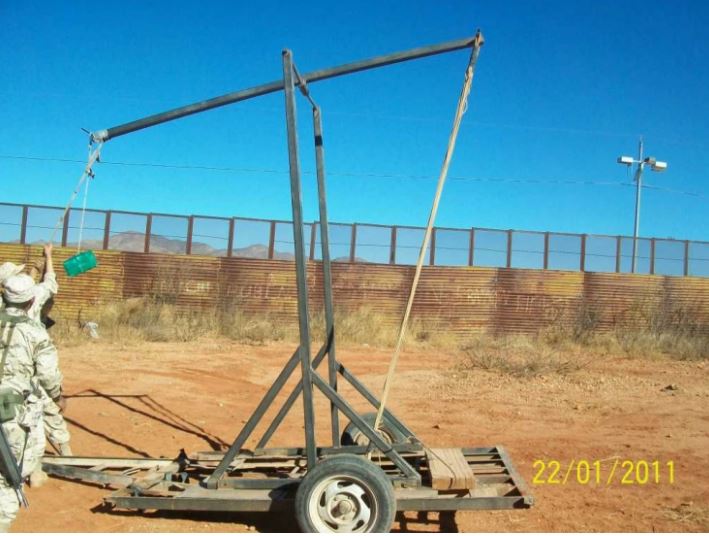Federal authorities in Mexico have discovered a van outfitted with a makeshift bazooka, apparently intended to launch packages over the border with the United States, according to a statement from the Mexican national security commission.
In the past, drug smugglers have found creative ways to transport illegal goods — using air space, intricate underground tunnels and oceans to do so.
It was unclear whether the air cannon used in this instance was intended to traffic drugs, but authorities said Saturday that the van carrying it was parked in Agua Prieta in northeastern Sonora, a state that shares the border with Arizona, with no license plate and doors that were ajar.
Inside, federal police officers found an air compressor, a gasoline motor, an air storage tank and a “metallic tube of approximately 3 meters length (a homemade bazooka),” according to the police statement, which was translated from Spanish.
The unit had an opening in the rear hood through which the cannon could fire, police said.
Mexican police found a “homemade bazooka” that might've been used to fling drugs into the US https://t.co/RyAkCsyqez pic.twitter.com/nIn0AjTw6E
— Christopher Woody (@chrstphr_woody) September 19, 2016
U.S. Customs and Border Protection said in a statement that there have been “a variety of methods used to send contraband over the International Boundary Fence.”
Additional news on Mexico and marijuana
Border seizures are down How legal U.S. weed is putting dent in Mexico cartel profits
A quest for quality: In Mexico, new demand for ‘the good stuff’ grown in U.S., Europe
Task force commander: Agents raid 10 Oakland marijuana grow houses linked to Mexican cartel
Weed news and interviews: Get podcasts of The Cannabist Show.
Subscribe to our newsletter here.
Watch The Cannabist Show.
Peruse our Cannabist-themed merchandise (T’s, hats, hoodies) at Cannabist Shop.
The most common, it said, is “lobbing softball-sized packages of marijuana over the fence. Several ‘balls’ are thrown into a U.S. residential area, such as a backyard, and are retrieved by a co-conspirator.”
Smugglers have also been known to use a trebuchet, or catapult.
In 2011, suspects were captured on National Guard surveillance video using a catapult to fling marijuana over the U.S.-Mexico border near Naco, Ariz., according to ABC News. The suspects fled the scene, but authorities seized about 45 pounds of marijuana.
Then, several years ago, the use of air cannons, or homemade bazookas, to shoot contraband onto U.S. soil began to make headlines across the country.
U.S. border and customs agents told CNN in 2013 that they became aware of these cannons when Mexican authorities discovered one in an orange Dodge Ram pickup in Mexicali in the state of Baja California.

Then, several years ago, the use of air cannons, or homemade bazookas, to shoot contraband onto U.S. soil began to make headlines across the country.
U.S. border and customs agents told CNN in 2013 that they became aware of these cannons when Mexican authorities discovered one in an orange Dodge Ram pickup in Mexicali in the state of Baja California.
“It seems like within the last five to 10 years they have gotten really, really creative in how they bring their drugs across,” Andy Adame, who was a spokesman for the U.S. Customs and Border Protection at the time, told CNN following the incident.
Adame said he had been in law enforcement for more than 20 years and the air cannon discovered in Mexicali was “the first one that I’ve seen.”
“That was actually a pretty good one,” Adame told CNN. “They are definitely out of the ordinary.”
Guillermo Esparza, a U.S. Customs and Border Protection spokesman for the El Centro sector in Southern California, told The Washington Post that air cannons are similar to potato guns or T-shirt launchers, using built-up air pressure to launch drugs, such as marijuana, over the border.
The one in 2013 was fixed to a pickup truck, allowing the suspects to “drive up to the border, launch their contraband and drive away,” he said.
The projectiles can weigh up to 60 pounds, according to U.S. Customs and Border Protection.
Esparza said agents in Southern California have not seen any cannons since the 2013 incident.
The U.S. Customs and Border Protection said trebuchets and air cannons are seen “infrequently” in Arizona. Most of them are seized by Mexican authorities, the agency said in the statement.
“Just as we try to find ways to detect them,” Esparza said in an interview, “they’re trying to find ways to circumvent our detection methods.”
Azhar AlFadl Miranda contributed to this report.
